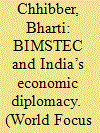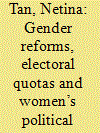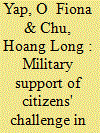|
|
|
Sort Order |
|
|
|
Items / Page
|
|
|
|
|
|
|
| Srl | Item |
| 1 |
ID:
183208


|
|
|
|
|
| Summary/Abstract |
Based on Web of Science records of ageing-related studies published during the 1900–2020 period, this article presents a review and comparison of economic studies on ageing in the global context and on the East and Southeast Asian economies. The analysis demonstrates that the global trend of these studies increasingly takes an interdisciplinary approach, and those on East and Southeast Asian economies have similarly expanded into various subdisciplines and covered more geographic locations. There are however gradual shifts in the focus of key areas of studies. Economic studies on ageing in East and Southeast Asian contexts are considerably less influential in that they are fewer in number and receive fewer citations. They also have a stronger emphasis on management efficiency, e.g. "operations research management science", but less on equitable management of relations in the workplace, such as industrial/labour relations. Overall, there are serious gaps in economic studies on ageing for the rapidly ageing societies in Asia, with respect to both geographic coverage and topical investigation.
|
|
|
|
|
|
|
|
|
|
|
|
|
|
|
|
| 2 |
ID:
183201


|
|
|
|
|
| Summary/Abstract |
The work and retirement behaviour of older people in East and Southeast Asia is a major social and economic policy issue. The region currently has a relatively strong labour force participation and intensity of work at older ages, although with variations across location, gender and education. Labour income remains the dominant source of elderly income, in part due to underdeveloped social protection systems. The drivers of work and retirement behaviour include health status, access to pensions, care responsibilities and retirement decisions of spouses. There is potential for public policy to extend productive working lives, while mitigating social impacts. This includes extending pension coverage, removing policy barriers to longer and flexible work, building formal care systems, strengthening lifelong learning, and addressing negative societal attitudes. There is also a need for evidence on the productivity of older workers, cost-effectiveness of policy interventions, and the optimal roles of state, markets and households in employment outcomes of older people.
|
|
|
|
|
|
|
|
|
|
|
|
|
|
|
|
| 3 |
ID:
144012


|
|
|
|
|
| Summary/Abstract |
It is time that India actually appreciates that the Bay of Bengal is strategically critical connecting the Indian and Pacific Oceans. India must back trans-border connectivity programme with political will. Through a more pro-active involvement in East and Southeast Asia India can emerge as a major actor in the Asia-Pacific and Southeast Asia region. This is paramount for India’s future economic development and strategic vision in the region. India’s economic diplomacy should be more ardent. India’s role is crucial in the changing economic architecture of the region.
|
|
|
|
|
|
|
|
|
|
|
|
|
|
|
|
| 4 |
ID:
179265


|
|
|
|
|
| Summary/Abstract |
We adopt a game theory approach that considers democratization as the result of strategic interactions between government and nongovernment actors in East and Southeast Asia, and test the implications systematically with data from South Korea, Thailand, Taiwan, the Philippines, and Indonesia. This makes three contributions to scholarship. First, the synergy of a game theory framework based on area studies information draws attention to the conditions under which players’ threats or actions are credible, to support inclusive theory-building. Second, the consistent findings across East and Southeast Asian countries often cited as critical cases on opposite sides of larger debates in the discipline, and across different operationalizations of democratization, support the idea that democratization occurs under weak economic conditions. Third, our rigorous tests beyond regime change-over, and across empirically derived heuristics of time span, fill theoretical and empirical lapses in order to adjudicate democratization in the region and provide a clear theoretical and empirical lens for current and future analyses.
|
|
|
|
|
|
|
|
|
|
|
|
|
|
|
|
| 5 |
ID:
145753


|
|
|
|
|
| Summary/Abstract |
In the last two decades, more than 118 countries and political parties around the world have introduced gender quotas to guarantee women’s political representation. While the study of gender quotas and electoral systems is an exciting field, few studies have focused on East Asia. Why do traditionally male-dominated parties engage in gender reforms? Have gender reforms improved women’s political representation and participation? To address these questions, this introductory article offers an overview of the electoral rules, gender quotas, and candidate selection methods adopted in three broadly similar cases with different outcomes in Taiwan, South Korea, and Singapore. Taiwan and South Korea introduced mixed electoral systems and legislated candidate quotas to improve women’s legislative representation at the local and national levels. Singapore resisted legislating gender quotas while the ruling party voluntarily introduced a party quota in 2009. These gender equality strategies have brought slow and uneven results. Based on qualitative and quantitative methods as well as survey and electoral data, this paper offers new evidence showing why the effects of electoral systems and quota strategies are not automatic or mechanical, but dependent on the degree of party system institutionalization, electoral competitiveness, legal enforcement, and social-cultural attitudes toward women.
|
|
|
|
|
|
|
|
|
|
|
|
|
|
|
|
| 6 |
ID:
142076


|
|
|
|
|
| Summary/Abstract |
When do militaries in the newly industrialized countries of East and Southeast Asia support their governments, when do they support citizens' challenge of government, and when do they launch coups? We propose and test a theory of military behavior using data from across East and Southeast Asia between the 1970s and 2008. The results corroborate the model's predictions to make four contributions: First, the model provides a framework of military behavior for countries to expand study beyond coups or the absence thereof. Second, the findings bring to focus the influence of citizens on the military's behavior, an aspect largely overlooked in scholarship of the region. Third, the necessary conditions—weak economy and galvanized citizens' challenge— that affect the military's behavior vis-à-vis citizens and the government highlight the strategic interaction treatment. Fourth, this study broadens systematic treatment to enrich empirics and theory-building for the political economies of these countries.
|
|
|
|
|
|
|
|
|
|
|
|
|
|
|
|
|
|
|
|
|